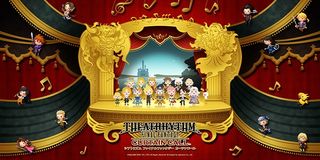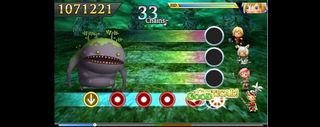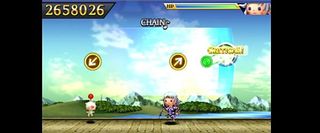Review: Theatrhythm Final Fantasy: Curtain Call Hits A Very High Note

Swords as big as a house, perfectly coiffed hair, giant yellow birds and airships. Ask any Final Fantasy fan what they remember most about the long-running series and it's likely that one, if not all, of those things I just mentioned will make the list. Even more likely to spring to the lips of series diehards, though, is “the music.” The Final Fantasy series has always been known for its fantastic soundtracks, which finally take center stage in the newly released Nintendo 3DS rhythm game, Theatrhythm Final Fantasy: Curtain Call.
The beautiful thing about Final Fantasy's soundtracks are that you never quite know what you're going to get. From dramatic and sweeping orchestral scores to growling rock songs, the tracks comprise a wide array of instruments and genres. It should come as no surprise, then, that Theatrhythm Final Fantasy: Curtain Call sports a massive set list of 200-plus songs for players to dive into.
Curtain Call is one of those infamous upgraded versions of a game that takes something that did well and bolts on some new bells and whistles in order to sell it a second time. At least, that's how I typically feel about these types of “enhanced” games. Curtain Call has me (quite literally) singing a different tune, though. Compared to the original Theatrhythm, Curtain Call's song list is nearly three times as long, plus it supports brand new game modes and collectable items. It's an update that makes a valid argument for its existence; one fans of the original can still get plenty of miles out of.
In Curtain Call, your job is pretty simple: Pick a team of four characters from your favorite Final Fantasygame to send on an adventure. Said adventure takes place on three types of song tracks: Battle music, adventure music and event music.
Battle music consists of the more fast-paced numbers that will have you tapping and swiping at a steady clip. These songs take place on a setting that looks like a traditional RPG battle screen, with triggers flying across the screen at your characters to be nailed in succession.
Adventure music is more low key, and shows your character simply trekking across a large landscape, starry eyed and enjoying the road ahead. The scenes running in the background match up with various landscapes in the series, and I frequently caught myself missing cues at first because I wanted to pick out all of the noticeable landmarks. In these songs, triggers move across the screen in a single lane, meaning your eyes don't need to dance up and down the top screen like in the battle songs.

Finally, the event music is perhaps best described as music videos. CG scenes play out in the background while the trigger moves around the screen in various patterns, forcing you to follow the dancing, darting beam of light while Sephiroth and Cloud fight or Tidus and Yuna fall in love. Or maybe those relationships were the other way around. It's hard to tell sometimes.
CINEMABLEND NEWSLETTER
Your Daily Blend of Entertainment News
Your job boils down to three main interactions: Tap, swipe and hold. Tap the screen when a red trigger hits the appropriate zone, swipe the yellow triggers in the direction indicated, and hold the green notes while they're still on the screen. In adventure songs, you also have to slide your held notes up and down to follow a snaking pattern, and hold notes are also frequently ended with a quick swipe in one direction or another. But that's basically it. It's a simple formula, but it gets the job done. There's also a button pressing option for those of you who prefer to go that route, as well as a third option that combines the two methods.
Your party also comes in handy when tackling a tricky song, making them more than just random avatars for your adventures. Characters with high strength stats do more damage in battle songs, for instance, which typically translates to more treasure chests unlocks. Your characters level up just like in an RPG, too, meaning you'll have plenty of reason to keep rotating them out on a quest for all 99's. They also gain new abilities as they level, which are triggered withing the songs when, say, your health hits a certain level or you nail a certain number of notes in a row. From damaging incantations to healing spells and summons, the way you build your team can actually have a large impact on your success in higher difficulty areas. You can also equip a single helpful item to your team, and each character can be further enhanced by spending collectable cards on their abilities.

Those “collectacards” are more than stat boosts, though, and go to further beef up this already hefty experience. You have access to a virtual album where the cards are stored, each one offering information on the character or monster it displays. You can read them, flip them around and, yes, even try to collect rare versions of your favorite cards. That's just one of the many types of unlockable items in the game, though. Everything you do in game will earn you a currency called Rhythmia. As your Rhythmia pool grows, you'll unlock loads of new characters, songs, options and more. Dozens of new characters have been added since the original Theatrhythm, so you'll likely want to keep on grinding if you hope to see everything the game has to offer.
As for the game modes, you can always dive into the single song mode, which lets you tackle any unlocked ditty from usual suspects like Final Fantasy VII or FF I, as well as unexpected surprises like the movie, Advent Children, both Final Fantasy MMOs, and even more offbeat titles like Mystic Quest, Crystal Chronicles and the PSP fighting games Dissidia.
If you're looking to go on more of an adventure, then you can tackle Quest Medley mode, which offers maps filled with musical encounters and dungeons guarded by a final boss. Play your way through the the selected songs, choose which way to go on forking paths and even save your progress if you don't have time to tackle one of the three available quest lengths in one sitting.
Finally, there's the new versus mode, which lets you go head to head with another local or online player to see who has the best tapping skills. Earning successes can trigger game-altering affects in this mode, including smaller trigger zones, triggers that don't appear until right before they need to be used, and the devious rotating slide triggers.
Honestly, I can't think of one thing to put in the negatives column for Theatrhythm Final Fantasy: Curtain Call. It's a love letter to the music of the series, as well as the countless fans who adore it. The soundtrack is massive, as are the list of collectibles, game modes, options and extras. It's rare that I come across a game that so perfectly delivers its intended experience and, when such a game appears, I happily sing its praises.
Players: 1 (2 multiplayer)
Platforms: 3DS
Developer: Square Enix
Publisher: Square Enix
ESRB: Teen
Rating:

Staff Writer for CinemaBlend.
Most Popular






